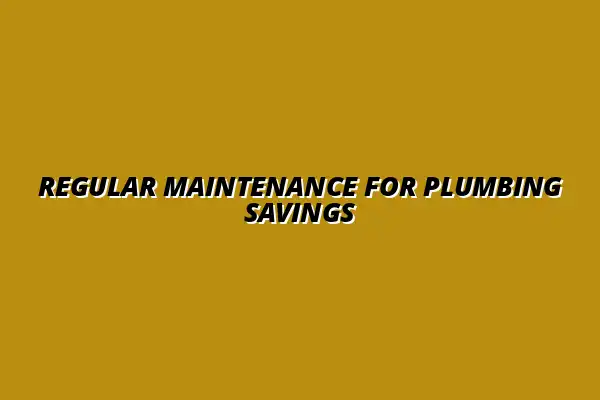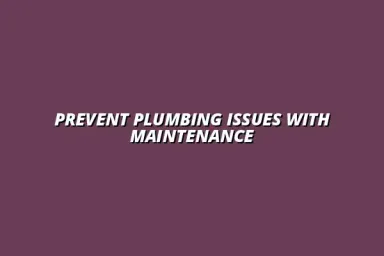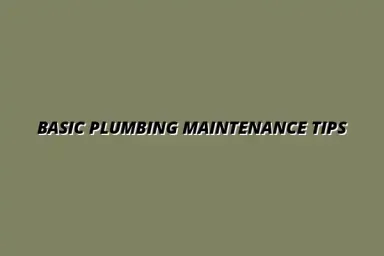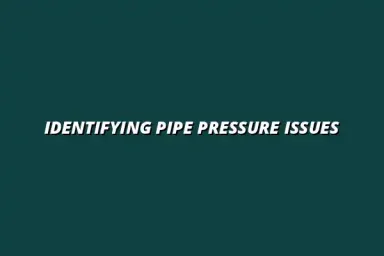Understanding the Importance of Regular Plumbing Maintenance
Regular plumbing maintenance is crucial for keeping your home's plumbing system in good working order. By taking the time to perform routine checks and maintenance, you can avoid serious plumbing issues and costly repairs later on. It's not just about fixing problems as they arise; it’s about being proactive to maintain the health of your plumbing system.
In essence, regular plumbing maintenance involves a series of planned activities designed to keep plumbing systems functioning efficiently and effectively. This includes everything from minor repairs to inspections aimed at detecting potential problems before they escalate. After all, a little effort upfront can save you a lot of money and stress down the line!
Defining Regular Plumbing Maintenance
When we talk about regular plumbing maintenance, we refer to a routine of inspections, cleanings, and repairs that homeowners should perform. This helps to identify issues before they turn into major headaches. It’s about creating a consistent schedule to ensure that all aspects of your plumbing are thoroughly checked and maintained.
To make the concept clearer, think of plumbing maintenance as a health check-up for your home. Just as you visit a doctor for a routine check-up, your plumbing system also needs attention to function well and avoid breakdowns. This can be done by following established maintenance practices and being attentive to signs of trouble. For example, regularly flushing your pipes can help remove sediment buildup. Check out this helpful guide on how to flush pipes to remove buildup to learn more.
What Does Routine Plumbing Maintenance Involve?
Routine plumbing maintenance can cover a variety of activities. Here are a few key components:
- Inspecting pipes for leaks or corrosion.
- Checking water pressure levels to ensure they are within normal ranges.
- Cleaning drains to prevent clogs.
- Flushing water heaters to remove sediment buildup.
- Testing sump pumps and other systems to ensure they are operational.
By performing these tasks on a regular basis, you can catch small issues before they lead to significant problems. Plus, it helps in enhancing the efficiency and safety of your plumbing system.
Key Activities in Plumbing Maintenance
There are several key activities that should be included in your plumbing maintenance plan. These activities help ensure that your plumbing is functioning properly and can prevent costly repairs in the future:
- Regular inspections of all visible plumbing fixtures.
- Clearing out debris and blockages from drains and gutters.
- Testing for leaks around fittings and connections.
- Changing or cleaning faucet aerators and showerheads.
- Monitoring water bills for sudden increases, which can indicate leaks.
By incorporating these activities into your routine, you can keep your plumbing system running smoothly and efficiently. For more specific advice on bathroom plumbing maintenance, consider this resource on essential bathroom plumbing maintenance tips. It’s a small commitment that pays off in the long run!
Common Plumbing Issues Resulting from Neglect
If plumbing systems are not properly maintained, they can lead to various problems that can be both frustrating and expensive. Neglecting these systems can result in issues such as leaks, clogs, and even full-blown plumbing failures. These problems can disrupt your daily life and require a lot of time and money to fix!
Identifying these common issues can help you understand the importance of regular maintenance. By staying informed, you can take the necessary steps to prevent these problems from arising in the first place. Learning how to detect hidden pipe leaks can be particularly valuable. Here's a guide on detecting hidden pipe leaks at home.
Identifying Costly Repairs Linked to Poor Maintenance
Some plumbing issues can lead to extremely costly repairs if not addressed in time. Here are a few examples:
- Major pipe leaks might require extensive repairs and water damage restoration.
- Clogged drains can lead to overflow and damage to flooring or foundation.
- Neglected water heaters can fail and lead to costly replacements.
- Corroded pipes may lead to a complete plumbing overhaul.
Recognizing the potential costs associated with these problems highlights why regular plumbing maintenance is essential. For a comprehensive checklist of annual plumbing maintenance tasks, see this annual plumbing maintenance checklist. It might feel like an inconvenience, but investing time in maintenance can result in significant savings.
The Impact of Neglected Plumbing on Property Value
When plumbing issues are ignored, the overall value of your property can take a hit. Potential buyers may be put off by visible plumbing problems or signs of neglect. Not to mention, homes with plumbing issues often require expensive repairs, making them less attractive on the market!
Maintaining your plumbing system can enhance your property’s appeal and ensure that it remains a valuable asset. By addressing repairs and maintaining your plumbing regularly, you can help preserve the value of your home for years to come. Regular maintenance is crucial for all aspects of your home's plumbing, including your kitchen. You might find this guide on essential plumbing maintenance for homes helpful.
Benefits of Regular Plumbing Maintenance
Regular plumbing maintenance is not just about avoiding problems; it offers numerous benefits that can enhance your home and quality of life. From cost savings to improved safety, the perks of maintaining your plumbing system are substantial! Let’s delve into the advantages.
By investing in regular maintenance, you’re likely to see a positive impact on your plumbing system’s performance, longevity, and efficiency. This means fewer unexpected issues and a more comfortable living environment for you and your family. Proper water heater maintenance is a key part of this. For tips on this, explore these essential water heater maintenance tips.
How Preventative Measures Reduce Repair Costs
Implementing preventative maintenance measures can significantly cut down on repair costs. Here’s how:
- Routine inspections can catch potential problems early, before they escalate.
- Regular cleaning helps to avoid clogs and backups.
- Replacing worn parts before they fail can prevent extensive damage.
- Keeping up with water heater maintenance can avoid a full replacement.
By taking these preventative steps, you’re likely to spend far less on repairs compared to dealing with emergencies or major issues later on. It’s all about staying ahead!
The Role of Maintenance in Extending Plumbing System Lifespan
Another key benefit of regular plumbing maintenance is that it helps to extend the lifespan of your plumbing system. When you keep your plumbing well-maintained, you reduce wear and tear on pipes and fixtures. This means that your system can continue to function properly for many years.
Additionally, maintaining your plumbing can enhance its efficiency, which can lead to lower water bills and better environmental sustainability. Taking care of your plumbing is a win-win situation!
Frequency and Scheduling of Plumbing Inspections
Knowing how often to schedule plumbing inspections is key for effective maintenance. Regular inspections ensure that your plumbing system remains in tip-top shape, helping to catch potential issues before they develop into costly repairs. It's a simple yet powerful way to protect your home!
Typically, homeowners should plan for a thorough plumbing inspection at least once a year. However, if you live in an older home or if you've noticed issues previously, more frequent inspections may be advisable. If you need a plumber in the Birmingham area, consider checking out this plumbing service in Billesley, Birmingham.
How Often Should Plumbing Systems Be Inspected?
Here are some guidelines on the frequency of plumbing inspections:
- Annual inspections for standard homes.
- Bi-annual inspections for older homes or homes with known issues.
- Immediate inspections if you notice signs like leaks or unusual water bills.
By following these guidelines, you can ensure that your plumbing system remains in excellent condition, allowing you to catch issues early and keep your home running smoothly.
Creating a Plumbing Maintenance Calendar for Homeowners
Establishing a plumbing maintenance calendar can help homeowners stay organized and proactive. Here’s how to create one:
- List all maintenance tasks and inspections needed.
- Assign specific months or seasons for each task.
- Set reminders to complete each task on time.
- Document any repairs or observations for future reference.
A maintenance calendar not only helps with staying on track but also offers a clear picture of the health of your plumbing over time. It’s a simple tool that can make a significant difference!
Addressing Common Questions and Concerns
What Are the Most Common Plumbing Problems and How to Prevent Them?
When it comes to plumbing issues, some problems pop up more often than others. These *common plumbing problems* can lead to major headaches if not tackled promptly. By understanding them, homeowners can take preventive steps to keep their plumbing systems running smoothly.
Two of the most frequent issues are drain clogs and pipe leaks. Drain clogs can occur due to a buildup of hair, grease, or other debris. Meanwhile, pipe leaks can stem from corrosion or high water pressure, both of which can lead to significant damage if left unchecked.
- Drain Clogs: Regularly clean drains to prevent buildup.
- Pipe Leaks: Inspect pipes for any signs of moisture or corrosion.
- Running Toilets: Check for faulty flappers that can waste water.
Prevention Strategies for Seasonal Plumbing Challenges
Seasonal changes can bring unique plumbing challenges that require attention. For example, freezing temperatures can cause pipes to burst, while heavy rains can overwhelm drainage systems. Here are some effective prevention strategies:
- Insulate pipes in colder areas of your home.
- Ensure gutters and downspouts are cleaned and clear of debris.
- Check sump pumps before heavy rain seasons.
By taking these proactive steps, homeowners can avoid many seasonal plumbing issues before they escalate into costly repairs!
How Can Homeowners Identify Plumbing Problems Early?
Detecting plumbing problems early can save you both time and money. Homeowners should be vigilant and look for signs that indicate potential issues. By paying attention to the warning signs, you can address problems before they turn into major headaches.
- Water Stains: Look for discoloration on walls or ceilings.
- Unusual Sounds: Listen for gurgling or dripping sounds.
- Low Water Pressure: Monitor any sudden drops in water pressure.
The Importance of Regular Monitoring and Documentation
Keeping track of your plumbing system can make a big difference. Regular monitoring can help you catch problems early. You might find it helpful to keep a plumbing journal detailing your observations and any maintenance performed.
Documentation not only allows you to track any changes but also provides a clear history for any plumbers you might hire in the future. This can lead to more accurate assessments and quicker repairs.
Understanding the Environmental Impact of Plumbing Maintenance
Plumbing maintenance plays a critical role in conserving resources and protecting the environment. Sustainable practices can help reduce water usage and minimize waste, contributing to a healthier planet.
Sustainable Practices for Plumbing System Maintenance
Here are some sustainable plumbing practices you can implement:
- Install water-efficient fixtures like low-flow faucets and toilets.
- Utilize rain barrels to collect rainwater for outdoor use.
- Consider eco-friendly drain cleaners instead of harsh chemicals.
These practices not only benefit the environment but can also lead to lower utility bills!
Water Conservation Techniques and Their Benefits
Water conservation is essential in today’s world, and homeowners can play a pivotal role. Simple changes can lead to significant water savings, which is better for the environment and your wallet.
- Limit shower time and install timers to encourage shorter showers.
- Fix leaks promptly to prevent wasted water.
- Run dishwashers and washing machines only with full loads.
By adopting these conservation techniques, you can make a positive impact while enjoying the benefits of a well-maintained plumbing system.
Final Takeaways for Homeowners on Plumbing Maintenance
Building a Maintenance Culture at Home
Creating a culture of maintenance in your home can be rewarding. Engaging family members in plumbing upkeep can make the process easier and more enjoyable. Everyone can contribute to maintaining a happy and healthy plumbing system.
Encouraging Family Involvement in Home Maintenance
Involving your family in plumbing maintenance fosters responsibility and teamwork. Here are some tips to encourage participation:
- Assign simple tasks to children, like checking for leaks in bathrooms.
- Hold family meetings to discuss upcoming maintenance activities.
- Celebrate successes, like resolving a plumbing issue together!
Setting Reminders for Regular Plumbing Checks
Having a reminder system can ensure that plumbing checks are not overlooked. You can use digital calendars or apps to set notifications for maintenance tasks. Consistent reminders can help keep plumbing upkeep a priority throughout the year.
Next Steps for Homeowners to Implement
Getting started with your plumbing maintenance plan doesn't have to be overwhelming. You can take simple steps to ensure that your plumbing system stays in top shape. Let’s dive into how you can create a practical maintenance plan.
How to Get Started with Your Plumbing Maintenance Plan
Begin by assessing your current plumbing situation. Here are some steps to kick off your plan:
- Inspect all visible pipes and fixtures for signs of wear or leaks.
- Create a list of regular maintenance tasks and their frequency.
- Schedule inspections with a professional plumber if needed.
Resources for Homeowners: Guides and Local Professionals
Don’t hesitate to seek help! Whether it’s online guides or local plumbing experts, resources are available to assist you. Here are some suggestions:
- Online DIY plumbing resources and forums.
- Local plumbing services and maintenance companies.
- Community workshops on home maintenance.
By using these resources, you can empower yourself to take control of your plumbing maintenance and protect your home effectively!

 Kiran Almasi
Kiran Almasi

